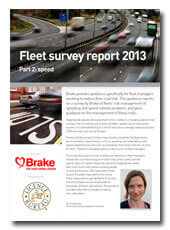 Brake, the road safety charity, has published a new report for fleet managers on driver speed, as part of its campaign to help organisations save lives, money and the environment by improving fleet safety.
Brake, the road safety charity, has published a new report for fleet managers on driver speed, as part of its campaign to help organisations save lives, money and the environment by improving fleet safety.
The report includes the results of a recent Brake survey of fleet managers, sponsored by Licence Bureau, along with best practice advice for managers. It focuses on the risks of inappropriate speed, and what steps managers can take to improve the safety of the whole fleet, as well as protecting vulnerable road users.
Driving too fast both increases your risk of crashing and causes more severe injuries in the event of a crash [1]. It is estimated that just a 1km/h reduction in average speed would save 2,200 lives each year across Europe [2].
Vulnerable road users such as pedestrians and cyclists are put at particularly high risk by speeding drivers. Fleet managers have a duty to ensure their drivers are driving slowly enough to protect vulnerable road users. Encouragingly, two thirds (65%) of fleet managers surveyed said they educated their drivers on looking out for vulnerable road users.
More than a quarter (26%) of survey respondents admitted to not knowing what proportion of their collisions involved one of their vehicles breaking the speed limit. On-board monitoring technology can help fleet managers to collect this information, and it is being widely adopted. Almost three quarters (61%) of managers operating a large fleet (more than 50 vehicles) said they monitored driver speed.
Roz Cumming, professional engagement manager at Brake, says: “Speed is one of the biggest killers on our roads. Fleet managers not only have a duty to ensure the safety of their drivers, but also to protect vulnerable road users. Monitoring driver speed and reminding drivers to keep well within speed limits, and to slow down even further around vulnerable road users can help. This report shows that some fleets are already addressing this risk, but there is still more that managers can do.”
Les Owen from Licence Bureau says: “We cannot deny that many of those who drive at work exceed the speed limit – many surveys support this. Speeding is a serious issue, not only in terms of collision frequency but correspondingly in terms of collision severity. Brake is addressing a real issue which can be managed. To reduce such risks, organisations should: have a clear policy that all employees adhere to speed limits; use realistic journey planning, taking account of congestion etc.; monitor compliance, for example through telematics; and challenge then address unsafe behaviour at both individual and organisational level.”
Road crashes are not accidents; the use of the term ‘accident’ undermines work to reduce road risk and causes insult to families whose lives have been torn apart by drivers taking risks on roads.
[1] Department for Transport (2008). Understanding inappropriate high speed: a qualitative analysis. Road safety research report 94
[2] European Transport Safety Council (2010) PIN Flash 16: Tackling the Three Main Killers on the Road
